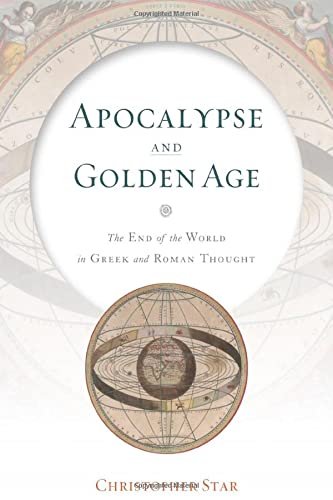Apocalypse and Golden Age: The End of the World in Greek and Roman Thought
Apocalypse and Golden Age: The End of the World in Greek and Roman Thought
Payment methods
- PayPal
- Credit card
- Bank transfer
- Pubblica amministrazione
- Carta del Docente
Details
- Author
- Star Christopher
- Publishers
- John Hopkins University Press, 2022
- Keyword
- Classica Ancient Rome Greece
- Cover description
- New
- Binding description
- H
- Dust jacket
- True
- State of preservation
- New
- Binding
- Hardcover
- Inscribed
- False
- First edition
- False
Description
8vo, hardcover in dj, 320pp. How did the ancient Greeks and Romans envision the end of the world?</b></p><p>What is the long-term future of the human race? Will the world always remain as it is or will it undergo a catastrophic change? What role do the gods, human morality, and the forces of nature play in bringing about the end of the world? In<i> Apocalypse and Golden Age</i>, Christopher Star reveals the answers that Greek and Roman authors gave to these questions. </p><p>The first large-scale investigation of the various scenarios for the end of the world in classical texts, this book demonstrates that key thinkers often viewed their world as shaped by catastrophe. Star focuses on how this theme was explored over the centuries in the works of poets, such as Hesiod, Vergil, Ovid, and Lucan, and by philosophers, including the Presocratics, Plato, Epicurus, Lucretius, Cicero, and Seneca. With possibilities ranging from periodic terrestrial catastrophes to the total dissolution of the world, these scenarios address the ultimate limits that define human life and institutions, and place humanity in the long perspective of cosmic and natural history. These texts also explore various options for the rebirth of society after world catastrophe, such as a return of the Golden Age or the redevelopment of culture and political institutions.<br> <br>Greek and Roman visions of the end, Star argues, are not calls to renounce this world and prepare for a future kingdom. Rather, they are set within larger investigations that examine and seek to improve personal and political life in the present. Contextualizing classical thought about the apocalypse with biblical studies, Star shows that the seeds of our contemporary anxieties about globalization, politics, and technology were sown during the Roman period. Even the prevalent link between an earthly leader and the beginning of the end times can be traced back to Greek and Roman rulers, the emperor Nero in particular. <i>Apocalypse and Golden Age</i> enriches our understanding of apocalyptic thought

